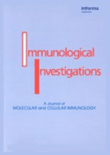
BMC IMMUNOLOGY
Scope & Guideline
Bridging Gaps in Immune System Understanding
Introduction
Aims and Scopes
- Mechanisms of Immune Response:
Research examining the cellular and molecular mechanisms underlying immune responses, including T and B cell activation, cytokine production, and immune regulation. - Autoimmunity and Inflammatory Diseases:
Studies focused on the pathogenesis of autoimmune diseases, inflammatory conditions, and their immunological underpinnings, providing insights into potential therapeutic targets. - Cancer Immunology:
Investigations into the interactions between the immune system and cancer, including immune evasion, tumor microenvironment dynamics, and the development of immunotherapies. - Infectious Diseases and Immunity:
Research exploring the immune response to various infectious agents, including viral, bacterial, and parasitic infections, and the implications for vaccine development and disease prevention. - Translational Immunology:
Studies bridging basic immunological research with clinical applications, including the development of novel immunotherapies and biomarkers for disease prediction and management. - Immunogenetics:
Research into the genetic factors influencing immune responses, susceptibility to diseases, and the role of genetic polymorphisms in immune-mediated conditions.
Trending and Emerging
- Cancer Immunotherapy:
There is an increasing emphasis on immunotherapy research, particularly the development of checkpoint inhibitors and personalized cancer vaccines, reflecting the growing importance of harnessing the immune system in oncology. - COVID-19 and Immunity:
Research related to COVID-19, including vaccine responses, long-term immunity, and the immune mechanisms underlying severe disease, has surged, driven by the global pandemic and its implications for public health. - Microbiome and Immunity:
Emerging studies focusing on the relationship between gut microbiota and immune responses are gaining traction, highlighting the importance of microbiome modulation in health and disease. - Biomarkers for Immune Responses:
The identification and validation of biomarkers for predicting immune responses to therapies and disease outcomes is a trending area, providing opportunities for personalized medicine. - Autoimmune Disease Mechanisms:
Research exploring the complex mechanisms underlying autoimmune diseases, particularly those integrating genetic, environmental, and immunological factors, is increasingly prominent. - Innate Immunity Research:
Investigations into the roles of innate immune cells, such as macrophages and dendritic cells, are on the rise, reflecting a broader understanding of their contributions to both health and disease.
Declining or Waning
- Traditional Vaccine Development:
Research specifically centered on traditional vaccine development methodologies has decreased, possibly due to the emergence of novel platforms such as mRNA and viral vector vaccines that have gained prominence. - Basic Immunology Studies:
There is a noticeable reduction in purely basic immunology studies without immediate clinical applications, as the field increasingly emphasizes translational research and practical applications of findings. - Single-Cell Analysis Techniques:
Although single-cell analysis remains a powerful tool, the focus on its application in immunology seems to be waning as researchers explore broader methodologies and integrative approaches. - Animal Models in Immunology:
Research employing animal models for studying immune responses is less frequent as there is a shift towards human-centric studies and the use of in vitro systems for initial investigations. - Environmental Immunology:
The exploration of environmental factors affecting immune function has diminished, potentially overshadowed by more pressing concerns related to infectious disease and cancer immunology.
Similar Journals

IMMUNOGENETICS
Bridging immunology and genetics for groundbreaking discoveries.IMMUNOGENETICS is a prestigious international journal published by Springer, focusing on the intricate relationship between immunology and genetics. Established in 1974, this journal has dedicated itself to advancing our understanding of genetic factors influencing immune responses, thereby playing a critical role in the fields of immunology and genetics. With an impact factor that reflects significant academic influence and a current ranking within the second quartile of genetics and third quartile of immunology, IMMUNOGENETICS is recognized for its contribution to high-quality research and impactful findings. The journal is accessible through traditional subscription methods, catering to a global audience keen on exploring pioneering research. Researchers, professionals, and students alike will find invaluable insights and advancements in this interdisciplinary field, making IMMUNOGENETICS an essential resource for anyone engaged in the studies of immunogenetics.

TRENDS IN IMMUNOLOGY
Bridging Research and Practice in ImmunologyTRENDS IN IMMUNOLOGY, published by CELL PRESS, stands as a premier source of insights and developments within the field of immunology. With an ISSN of 1471-4906 and E-ISSN of 1471-4981, this journal has established a strong reputation, evidenced by its prestigious status in Q1 quartiles for both Immunology and Allergy in 2023. It is ranked #13 out of 233 in the Scopus category of Medicine – Immunology and Allergy, and #16 out of 236 in Immunology and Microbiology, placing it within the top 94th and 93rd percentiles respectively. Since its inception in 1987, TRENDS IN IMMUNOLOGY has provided a critical platform for researchers, professionals, and students to access the latest advancements and integrative reviews in immunological research. The journal offers open access options, enhancing the accessibility of its high-impact content to a global audience. Researchers and practitioners rely on its pages not only for cutting-edge findings but also for comprehensive discussions that drive the future of immunology research.

IMMUNOLOGICAL INVESTIGATIONS
Unraveling Complexities in Immune Mechanisms and TreatmentsIMMUNOLOGICAL INVESTIGATIONS, published by Taylor & Francis Inc, is a leading journal in the field of immunology and related medical sciences, with an established presence since 1972. With a focus on cutting-edge research and critical insights in immunological methods and theories, this journal serves as a pivotal platform for researchers, professionals, and students alike. Though it currently holds a Q3 ranking in Immunology and a Q2 ranking in miscellaneous medicine as of 2023, its Scopus rank of #129 out of 236 reflects its dedication to advancing the understanding of immune responses and therapies. The journal's commitment to rigorous peer review and high-quality publications enables it to remain relevant and influential in the ever-evolving landscape of immunological research. Subscription is required to access its extensive archive, which spans critical developments in the field of immunology from 1972 to 2024.

GENES AND IMMUNITY
Connecting Genetic Discoveries with Immune InnovationsGENES AND IMMUNITY, published by SpringerNature, is a leading scholarly journal dedicated to advancing the field of genetics and immunology. With an impressive impact factor and a distinguished ranking in the Q1 quartile of both Genetics and Immunology disciplines for 2023, this journal serves as a pivotal platform for researchers and professionals looking to explore the intricate relationships between genetic factors and immune responses. Established in 1999 and continuously published until 2024, it features high-quality peer-reviewed research articles, reviews, and commentary that address critical issues and recent advancements in the field. The journal adheres to rigorous academic standards, evidenced by its strong Scopus rankings, making it a valuable resource for students, researchers, and practitioners alike who are seeking to deepen their understanding of genetics' role in immunity. For those looking to keep abreast of cutting-edge insights, GENES AND IMMUNITY is an essential read.

INTERNATIONAL IMMUNOLOGY
Elevating the Standards of Immunological Research Worldwide.INTERNATIONAL IMMUNOLOGY, published by OXFORD UNIV PRESS, stands out as a premier journal in the field of immunology, providing a vital platform for disseminating groundbreaking research and innovative developments within the discipline. With an impressive Q1 ranking in Immunology and Allergy, as well as in Medicine (miscellaneous), it consistently showcases high-impact studies that contribute to the advancement of immunological knowledge. The journal spans over three decades, from its inception in 1989 to its ongoing contributions as of 2024, thus solidifying its reputation in the scientific community. Researchers, professionals, and students will find valuable articles that delve into the complexities of immune responses, therapeutic interventions, and emerging immunological paradigms, ensuring INTERNATIONAL IMMUNOLOGY remains at the forefront of knowledge in the life sciences.

International Journal of Immunogenetics
Advancing the Frontiers of Immune GeneticsInternational Journal of Immunogenetics, under the esteemed publication house WILEY, serves as a pivotal platform for researchers and professionals in the fields of immunology and genetics. With an ISSN of 1744-3121 and an E-ISSN of 1744-313X, this journal offers a rich repository of scholarly articles and research findings that advance our understanding of immune system genetics. Hailing from the United Kingdom, the journal maintains an impactful presence with category quartiles reflecting a Q3 rating in Genetics and Immunology and a Q2 in Medicine (miscellaneous), positioning it as a credible source of scientific knowledge. It encompasses studies from converged years ranging from 1974 to 1996 and again from 2005 to 2024, ensuring a robust collection of both historical and contemporary research. Researchers are encouraged to engage with its content, given its Scopus rankings—highlighting the journal’s relevance in a competitive academic landscape. As an open-access title, International Journal of Immunogenetics strives to enhance accessibility to vital research, fostering collaboration and innovation in the genetic and immunological domains.

HUMAN IMMUNOLOGY
Illuminating the Pathways of Human ImmunologyHUMAN IMMUNOLOGY, published by Elsevier Science Inc, serves as a critical platform for disseminating research in the fields of immunology and allergy, as well as various aspects of miscellaneous medicine since its inception in 1980. With an ISSN of 0198-8859 and E-ISSN 1879-1166, this journal is pivotal for researchers and practitioners looking to advance their understanding of human immune responses and related conditions. The journal currently holds a respectable position within its field, as highlighted by its 2023 Scopus ranks—#114/233 in Immunology and Allergy and #132/236 in Immunology and Microbiology. Moreover, it maintains a Q2 quartile ranking in both Immunology and Allergy and miscellaneous Medicine, underscoring its influence and reach within the scientific community. Although it does not currently offer Open Access options, HUMAN IMMUNOLOGY remains dedicated to providing valuable insights and fostering academic discourse within its discipline, characterized by a rigorous peer-review process and a focus on innovative research trajectories.

CELLULAR IMMUNOLOGY
Illuminating the Pathways of Immune MechanismsCELLULAR IMMUNOLOGY is a prestigious journal published by Academic Press Inc. Elsevier Science, dedicated to advancing the field of immunology. Established in 1970 and converging ongoing research up to 2024, this journal has carved out a significant niche within the academic community, boasting a notable Q2 ranking in the Immunology category and holding a respectable 67th percentile ranking within Scopus for its contributions to the disciplines of Immunology and Microbiology. The journal serves as a vital platform for disseminating high-quality research, reviews, and methodologies that elucidate the intricacies of cellular immune responses, thereby benefiting researchers, professionals, and students alike. Although it does not offer open access, the journal's impact is evidenced by its comprehensive coverage of pioneering studies and ongoing developments in the immunological sciences, positioning it as an essential resource for those seeking to deepen their understanding and engage with the latest findings in cellular immunology.

CANCER IMMUNOLOGY IMMUNOTHERAPY
Empowering Cancer Research through Immunological DiscoveriesCancer Immunology Immunotherapy, published by Springer, stands as a premier journal in the fields of cancer research and immunology, holding a prestigious Q1 ranking across multiple categories, including Oncology and Medicine as of 2023. With an ISSN of 0340-7004 and an E-ISSN of 1432-0851, this journal has been a pivotal platform for groundbreaking research since its inception in 1976, continuing to provide insight into the complex interactions between the immune system and cancer. The journal's scope encompasses a wide array of topics, including novel therapeutic strategies, immunological mechanisms, and translational science aimed at advancing treatment outcomes for cancer patients. Renowned for its rigorous peer-review process and high impact factor, it attracts contributions from leading experts and researchers around the globe, positioning itself among the top-tier publications with Scopus rankings that reflect its vital role in advancing the field. Access options are generally subscription-based, ensuring a comprehensive resource for professionals and academics seeking to deepen their understanding and make meaningful contributions to cancer immunotherapy.

Central European Journal of Immunology
Exploring New Horizons in Immune ResearchCentral European Journal of Immunology is a premier publication dedicated to advancing the field of immunology and allergy research. Established in 1996 and published by TERMEDIA PUBLISHING HOUSE LTD, this open access journal has consistently provided a platform for innovative research and comprehensive reviews since its transition to open access in 2002. With an ISSN of 1426-3912 and E-ISSN of 1644-4124, it embraces a global readership while being rooted in Poland. The journal, with a notable Q3 ranking in both the categories of immunology and allergy in 2023, positions itself within the competitive landscape of scientific discourse, as reflected in its Scopus rankings. Designed for researchers, professionals, and students, the Central European Journal of Immunology not only disseminates significant findings but also fosters collaboration and innovation in the immunological sciences, making it a vital resource for those seeking to stay current in this rapidly evolving field.